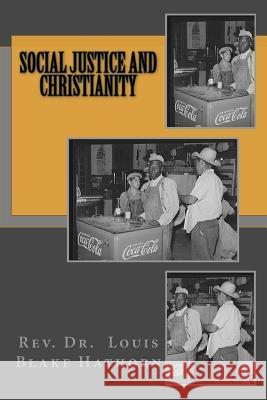Social Justice and Christianity » książka
Social Justice and Christianity
ISBN-13: 9781502336385 / Angielski / Miękka / 2015 / 154 str.
INTRODUCTION Reverend Dr. Louis Blake Hathorn, Jr. tackles the influence of Christianity on social change challenges in American history from Colonial America of the 17th and 18th Century to the continuing human rights struggles of the 21st Century. He drew on his personal experiences as a pastor of over 40 years at Sweet Home MB Church of Lexington, Mississippi. He is a veteran activist for civil rights in a state known for its historic oppression of African Americans, other minorities and its indigenous Native Americans. Social Justice and Christianity lays out the dichotomy within the Christian church, also found in other religions, between the repressive policies resulting in grave injustice opposing the principles of love, forgiveness and non-violence. Historically, the established American Christian church, supported by the powerful economic and political privileged class, maintained and aided the sins of slavery and prejudice that entrap and disenfranchise persons of color. Nowhere is this social and political tension presented more clearly than in the "Letter from Birmingham Jail," authored April 16, 1963 by Dr. Martin Luther King, Jr. while incarcerated. Dr. Hathorn explores the historic influence found in the African American Christian church that shouted out the principles of love, forgiveness, and non-violence as the appropriate modus operandi for social change in America. He recounts the terrible effects of slavery, racial segregation and unfair treatment of persons of color, and women and children from Colonial American to the present 21st Century challenges. In Colonial America, the Quakers spoke out against the sins of slavery, urged an end to slavery... Colonial American was a violent place. As Dr. Martin Luther King, Jr. noted, "This nation was born in genocide..." From the beginning of the European and slave trade settlements in America, oppressive policies impacting African Americans and non-white people were institutionalized and those remnants remain into the 21st Century. Social protests for justice and equality in all facets of American life remain controversial even as the prophetic Christian voice call for social change. Dr. Martin Luther King, Jr. recognized the principles of love and non-violence as strong themes in other world religions. He drew on the inspiration of Mohandas Gandhi, the Southeast Asian political and human rights activist of the Hindu faith who stated, "Non-violence is the greatest force at the disposal of mankind..." Other religions as well contained such prophetic strains of faith: Judaism has the Masorah. Islam has the Hadith... Dr. King's "Letter from Birmingham Jail," represents perhaps the greatest expression of love, forgiveness and non-violence... Here, the prophetic voices of Christianity, directed at the prominent white ecclesiastical infrastructure in Alabama, justified the need for non-violent protest. Dr. Hathorn described Dr. King's impact from the Birmingham jail, and later in 1963 at the March on Washington... Besides the powerful "I Have a Dream" speech by Dr. King, the United Auto Workers (UAW) President, Walter Reuther... Dr. Hathorn displayed his concern for the plight of Mexican farmworkers in his book. The UAW supported, not only African American rights, but also the rights of Native Americans, and other farmworkers. ...Cesar Chavez who was the champion fighter for the rights and fair wages of farmworkers. As if to answer the question in Dr. King's book, "Where do WE Go From Here," Dr. Hathorn exclaimed there remains a long, struggle ahead to deal with the throes of injustice that still ensnarl those of color... who were rendered hewers of wood. The work must go on And Dr. King offers the mantra, "Injustice anywhere is a threat to justice everywhere." The book, Social Justice and Christianity, by the Reverend Dr. Louis Blake Hathorn, Jr. is a must read. By Rev. G. David Singleton
Zawartość książki może nie spełniać oczekiwań – reklamacje nie obejmują treści, która mogła nie być redakcyjnie ani merytorycznie opracowana.











